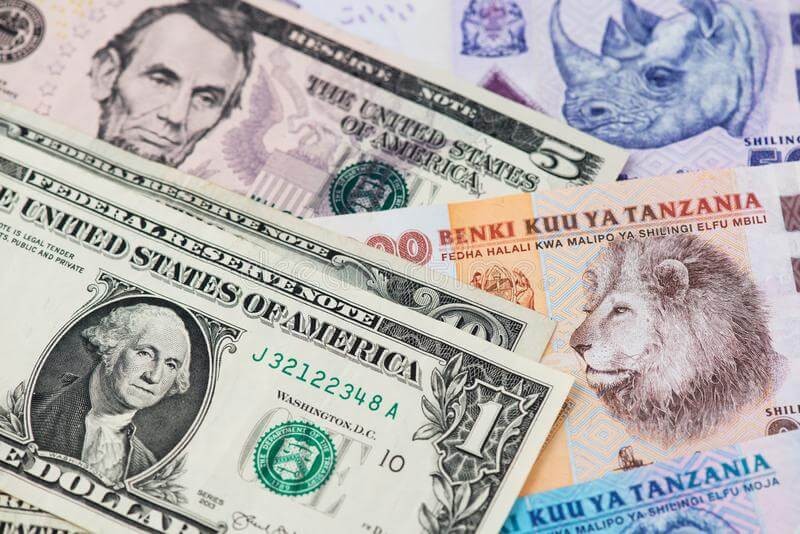The global economic landscape is constantly evolving, and one of the recent developments that have garnered attention in the country is the fall in the dollar conversion exchange rate concerning the Tanzania Shillings (TZS), which has reached an all-time low of 1USD /2500 TZS. This article aims to analyze the economic implications of this phenomenon, exploring the causes and potential effects on Tanzania’s economy and how we can mitigate this phenomenon.
A currency exchange rate refers to the value at which one currency can be exchanged for another. It represents the relative worth of different currencies in the international foreign exchange market. Exchange rates are crucial in international trade, investment, and financial transactions.
The valuation of the Tanzania Shilling (TZS) against the dollar in conversion is determined by various factors such as inflation rate, interest rates, GDP growth, and trade balance, which influence the value of its currency.
So from these factors, what has caused the sudden plummet in the Dollar in relation to Tanzania’s conversion rate? The following would be the most pretentious reasons:
- Global Economic Trends: The value of a country’s currency often fluctuates in response to global economic trends. If the U.S. economy experiences a slowdown or the Federal Reserve adopts a more accommodative monetary policy, it can lead to a decrease in the dollar’s value compared to other currencies, including the TZS.
- Interest Rate Differentials: Differences in interest rates between countries can influence exchange rates. Suppose Tanzania’s central bank maintains a relatively higher interest rate than the U.S. Federal Reserve. In that case, it can attract foreign investors seeking higher returns, leading to an appreciation of the TZS and a fall in the dollar conversion rate.
From a broader level, there must always exist some Economic Implications at both micro and macro levels, and these are:
- Imports and Exports: A fall in the dollar conversion exchange rate can positively and negatively affect Tanzania’s imports and exports. On the one hand, a weaker dollar makes Tanzania’s exports more competitive in the international market, potentially boosting export revenues and supporting local industries. On the other hand, imports become more expensive, leading to higher costs for businesses and potentially increasing inflationary pressures
- Tourism and Foreign Direct Investment (FDI): Tanzania’s tourism industry, which heavily relies on foreign visitors, may experience a boost due to a fall in the dollar conversion rate. A weaker dollar makes Tanzania a more affordable destination for international tourists, increasing the tourism sector’s competitiveness. Similarly, decreasing the dollar conversion rate can make Tanzania an attractive investment destination, potentially attracting foreign direct investment.
- Inflationary Pressures: A dollar conversion exchange rate fall can contribute to inflationary pressures in Tanzania. As the cost of imports rises, businesses may pass on these increased costs to consumers, leading to higher prices for goods and services. This can have an adverse impact on the purchasing power of individuals and potentially affect the overall standard of living.
- Government Debt and Budget Deficit: If Tanzania has significant external debt denominated in dollars, a fall in the dollar conversion rate can increase the repayment burden. Moreover, if the government relies on imports for infrastructure development or other projects, the higher costs associated with a weaker dollar can strain the budget deficit.
Tanzania’s economy dances amidst the tumultuous tides of the falling dollar conversion exchange rate, a delicate balancing act between opportunities and challenges. Navigating these uncharted waters requires astute monetary policies, a diversified economy, and unwavering dedication to enhancing export competitiveness. With these guiding stars illuminating the way, Tanzania can emerge stronger, wiser, and more resilient from this storm than ever before.
So how do we mitigate adversaries like inflation and having a deficit in the Government budget?
- Monetary Policy: The Bank of Tanzania can implement measures to stabilise the exchange rate, such as adjusting interest rates to attract foreign capital or intervening in the foreign exchange market. These actions can help balance promoting Tanzania’s economic growth and managing inflationary pressures. This should go hand in hand with the money supply and inflation ranking.
- Diversification of the Economy: Tanzania can focus on diversifying its economy by promoting non-traditional exports and developing sectors with high growth potential. This strategy can reduce the country’s reliance on imports and mitigate the impact of a weaker dollar on the overall economy.
- Enhancing Export Competitiveness: To take advantage of the increased export competitiveness resulting from a fall in the dollar conversion rate, the Tanzanian government can invest in infrastructure, provide incentives to local industries, and improve trade facilitation measures to support exporters.
The current fall in the dollar conversion exchange rate vis-à-vis the Tanzania Shillings has both positive and negative implications for Tanzania’s economic development. While it can enhance export competitiveness and attract tourism and investment, it also presents challenges such as inflationary pressures and increased costs of imports. To navigate these implications successfully, policymakers must employ appropriate monetary policies, diversify the economy, and enhance export competitiveness.

